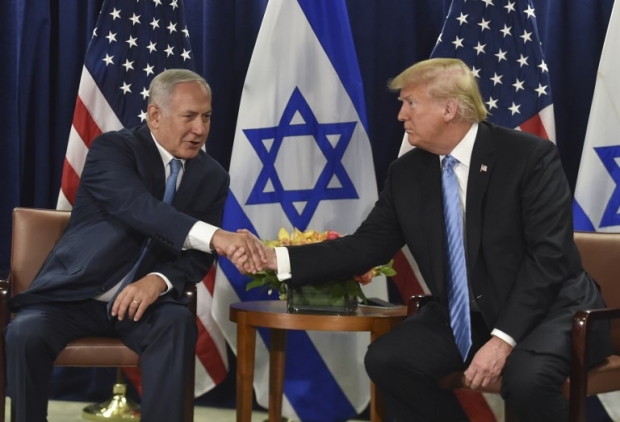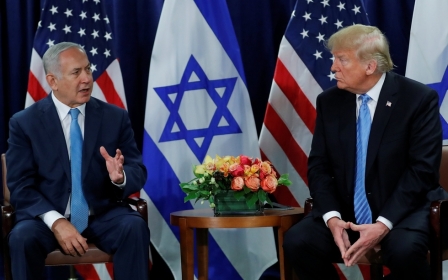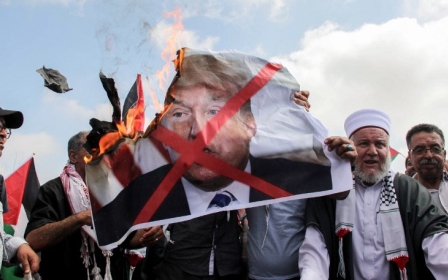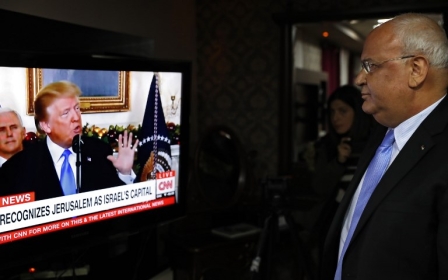The Middle East at the UN: Palestinians retaliate against Trump’s 'open war'
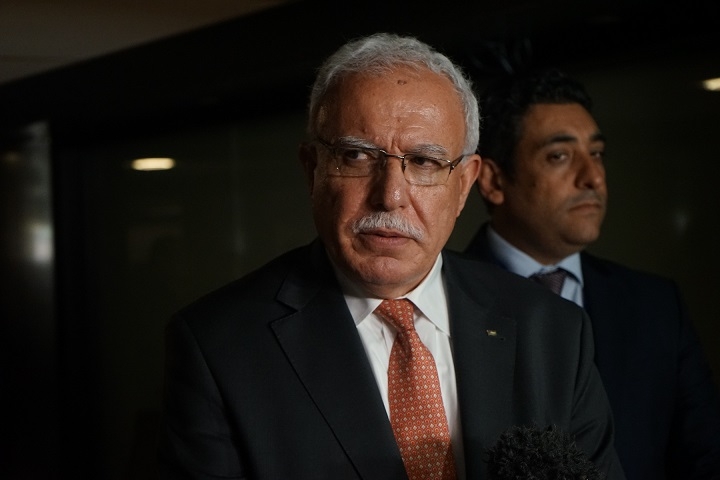
NEW YORK CITY, United States - Palestinian Foreign Minister Riyad al-Maliki spoke of an “open war” with the Trump administration on Wednesday, after closed-door talks with foreign diplomats in defiance of a US-led peace process that increasingly favours Israel at the expense of Palestinians.
Following the meeting, which Palestinian Authority President Mahmoud Abbas convened on the sidelines of the UN General Assembly, Maliki said the US was trying to “inflict the most damage” on Palestinians and spoke of drumming up support among some 40 sympathetic governments to “salvage” a peace process in which Palestinians get their own country.
We didn’t really ask for any war and we are not interested in entering any war with the Americans
- Riyad al-Maliki, Palestinian foreign minister
“We didn’t really ask for any war and we are not interested in entering any war with the Americans,” Maliki told reporters at the New York Grand Hyatt in response to a question from Middle East Eye.
“We are not showing our weapon, because we don’t have any. Except we come here to the United Nations, where we believe that this is the place for multilateralism and we do believe that through multilateralism we can achieve our basic rights.”
Palestinian officials said they met with some eight-to-ten foreign ministers, several other top government officials as well as the head of UN political affairs, Rosemary DiCarlo, and UN Middle East envoy Nickolay Mladenov.
Among them was Alistair Burt, the UK’s minister on the Middle East. Talking with reporters after meeting with Palestinian officials, Burt warned of the collapse of a peace process that began with the 1993 Oslo Accords.
“We shouldn’t let the efforts of so many years go by. Particularly, 25 years after the bravery of those who were involved in Oslo, now’s the time to recommit to a two-state solution and keep working at it,” said Burt.
The talks came amid mounting pressure from the Trump administration, which has cut funding for Palestinian refugees, shuttered Ramallah’s outpost in Washington and, in December, recognised Jerusalem as Israel’s capital and announced plans to relocate the US embassy there.
US President Donald Trump’s decision on the Holy City outraged Palestinians, who have since boycotted Washington’s peace efforts, led by the former reality television star’s son-in-law and senior adviser, Jared Kushner.
Earlier on Wednesday, Trump said he would unveil his long-awaited Israeli-Palestinian peace plan in two to four months and that he hoped to cut a deal to end the decades-old row in his first term, which ends in January 2021.
Amid widespread fears that Trump would significantly move the goalposts of a deal in Israel’s favour, Trump said he preferred the “two-state solution” that has been the bedrock for negotiations since the 1990s.
Speaking alongside Israeli Prime Minister Benjamin Netanyahu at UN headquarters, Trump indicated that he was haggling, saying the US reclassification of Jerusalem had granted Israel a “big chip” that required concessions as payback.
Trump also heaped pressure on the Palestinians, saying he had cut their funding from $550m per year down to nothing – but promised US cash-flows would “start up again” if Mahmoud Abbas returned to peace talks.
Taking sovereignty off the table
Palestinian officials in Ramallah are concerned Trump will take tougher steps, such as officially rejecting the demand that Palestinians who were displaced during Israel’s creation in 1947-48 should have the “right of return” to those lands.
In his UN General Assembly address, French President Emmanuel Macron swiped at Trump’s tactics, saying steamrolling the Palestinians with unilateral initiatives will not resolve the Israeli-Palestinian conflict.
“What can resolve the crisis between Israel and Palestine? Not unilateral initiatives, nor trampling on the legitimate rights of the Palestinian people to legitimate peace nor underestimating Israel’s fair right to security,” Macron told delegates.
Abbas and Netanyahu are set to make their own UN speeches on Thursday. Abbas is expected to ask for swift international intervention to save the two-state solution, or else he may be left picking from some undesirable options.
These could include ending security cooperation with Israel, suspending the Palestinian Authority’s recognition of Israel, the annulment of past agreements with Israel, or declaring the Palestinian territories to be a state under occupation.
We are doing so much damage to Humpty Dumpty that he can never be put back together again
- Hussein Ibish, Arab Gulf States Institute in Washington
According to Jonathan Schanzer, a former terrorism analyst at the US Treasury Department, Abbas is in a tight spot diplomatically and will only get limited assistance from Arabs, Europeans and other sympathetic partners.
“The goal here for Abbas is to make it not look as if he’s losing as badly as he’s losing. He’s been battered by this administration. The one area where Abbas has some relative leverage is at the UN, which he’s gone back to time and again,” Schanzer told MEE.
“It’s an attempt to show people back in Ramallah that he does have some leverage left in the world community. The problem with this entire approach is that it won’t change the dynamic for him. He’ll still be in a position of relative weakness, it’ll just play a little better back home.”
Hussein Ibish, a scholar at the Arab Gulf States Institute in Washington, said Trump was taking a wrecking ball to the 1993 Oslo Accords, in which Israelis and Palestinians recognised each other’s legitimacy and institutions and drew a roadmap for peace.
“The US message to the Palestinians is clear: the Oslo framework, the old agreements and basis for negotiations, are all gone. And we are doing so much damage to Humpty Dumpty that he can never be put back together again,” Ibish told Middle East Eye.
“The point of all of this appears to be to permanently take Palestinian sovereignty off the table.”
New MEE newsletter: Jerusalem Dispatch
Sign up to get the latest insights and analysis on Israel-Palestine, alongside Turkey Unpacked and other MEE newsletters
Middle East Eye delivers independent and unrivalled coverage and analysis of the Middle East, North Africa and beyond. To learn more about republishing this content and the associated fees, please fill out this form. More about MEE can be found here.


